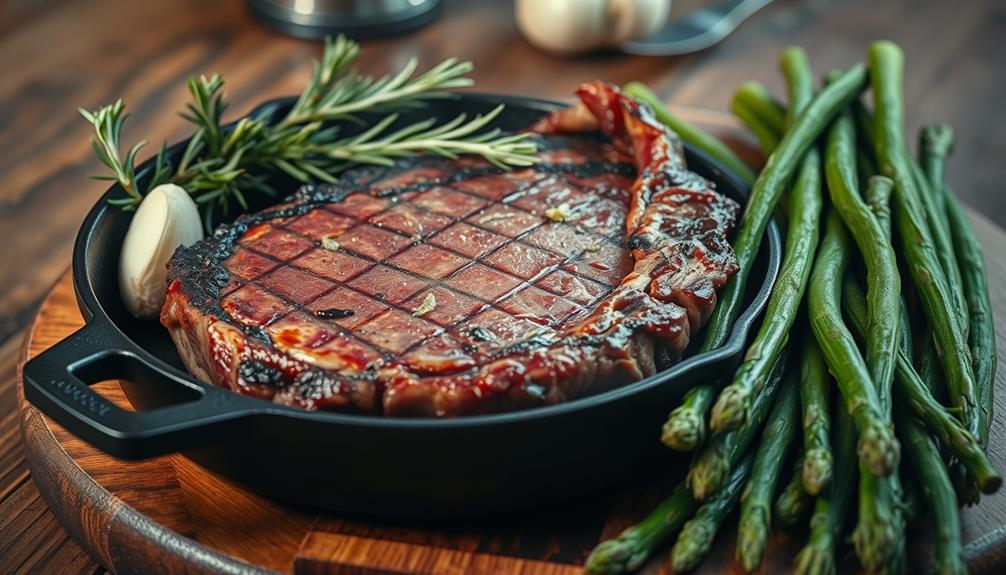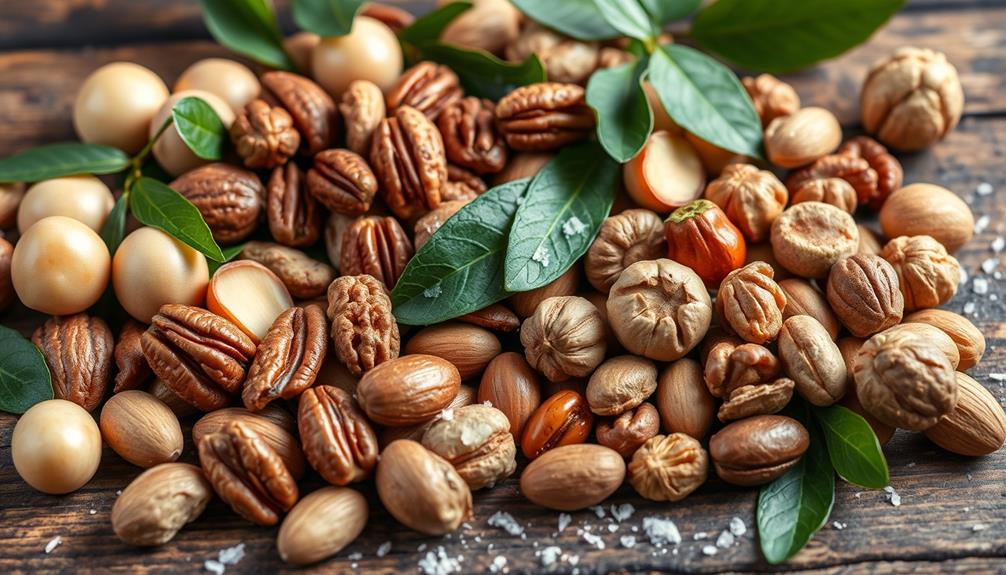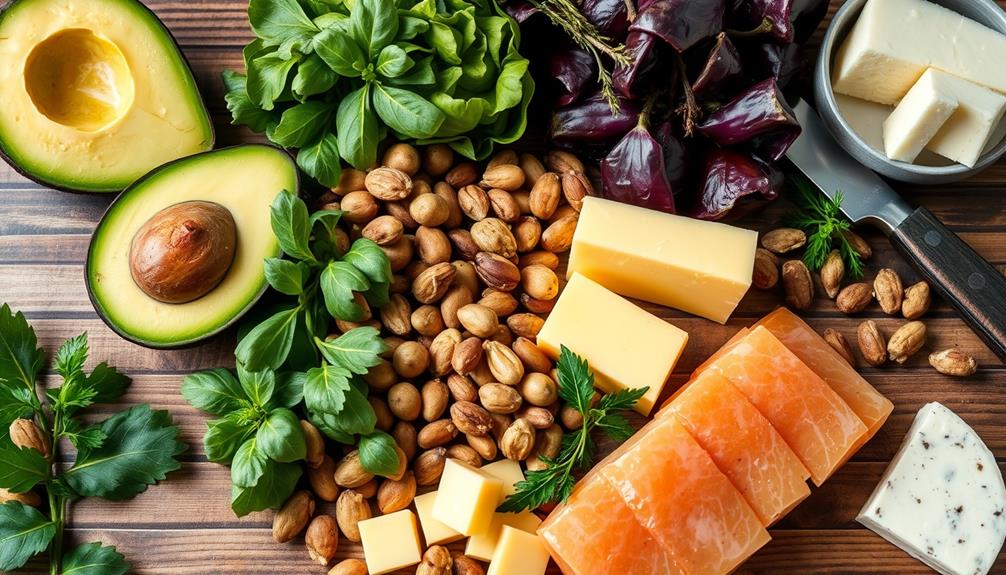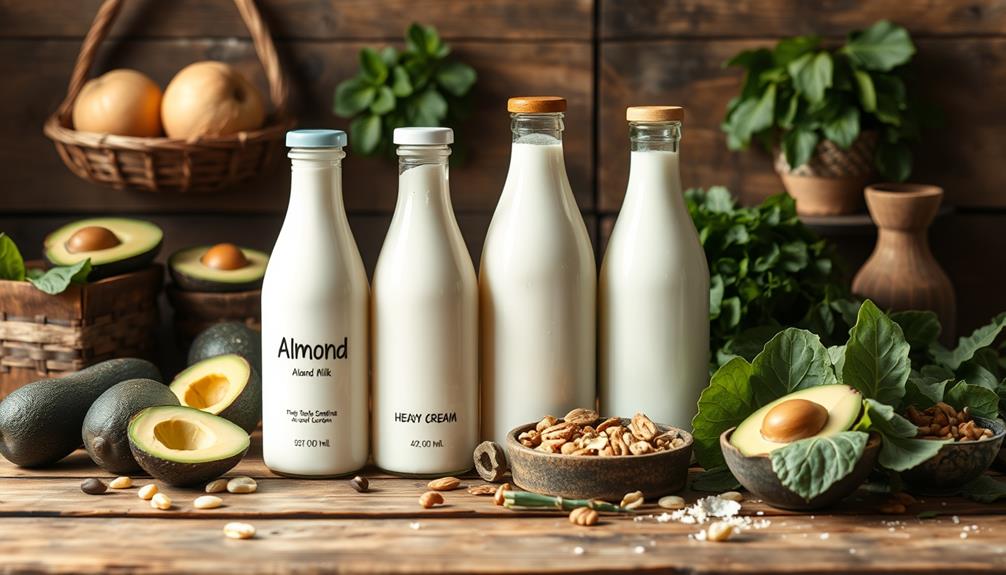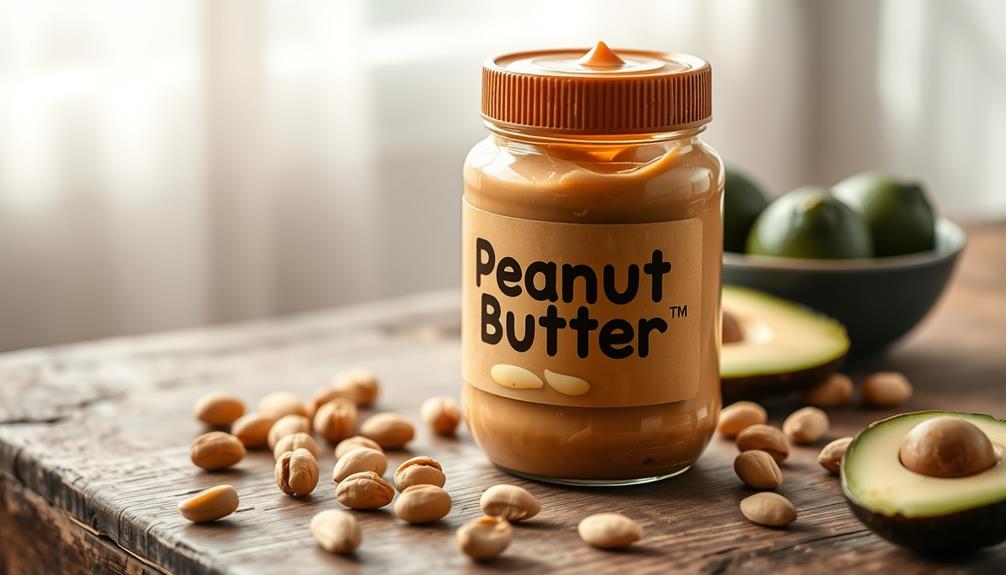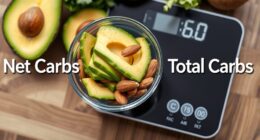If you're on a keto diet, ribeye steak is your best bet. It's packed with healthy fats, providing around 37.6g of fat per 100g, which helps you stay in ketosis while enjoying a flavorful meal. Ribeye also offers a whopping amount of protein—nearly 90.6g per pound. Other great options include skirt and New York strip steaks, but ribeye stands out for its rich taste and tenderness. Don't forget to prepare it right for maximum flavor. For more insights on choosing the perfect steak and delicious pairings, keep exploring what works best for your keto journey.
Key Takeaways
- Ribeye is the top choice for keto due to its high fat content and rich flavor, making it ideal for maintaining ketosis.
- Skirt steak offers intense flavor and quick cooking time, perfect for delicious keto meals.
- New York strip steak balances flavor and tenderness with good marbling, making it versatile for various keto dishes.
- Porterhouse steak provides generous portions with both tenderloin and strip sections, catering to hearty appetites while staying keto-friendly.
- Chuck steak is an affordable option with rich flavor, supporting dietary fat intake essential for a successful keto diet.
Is Steak Keto Friendly?
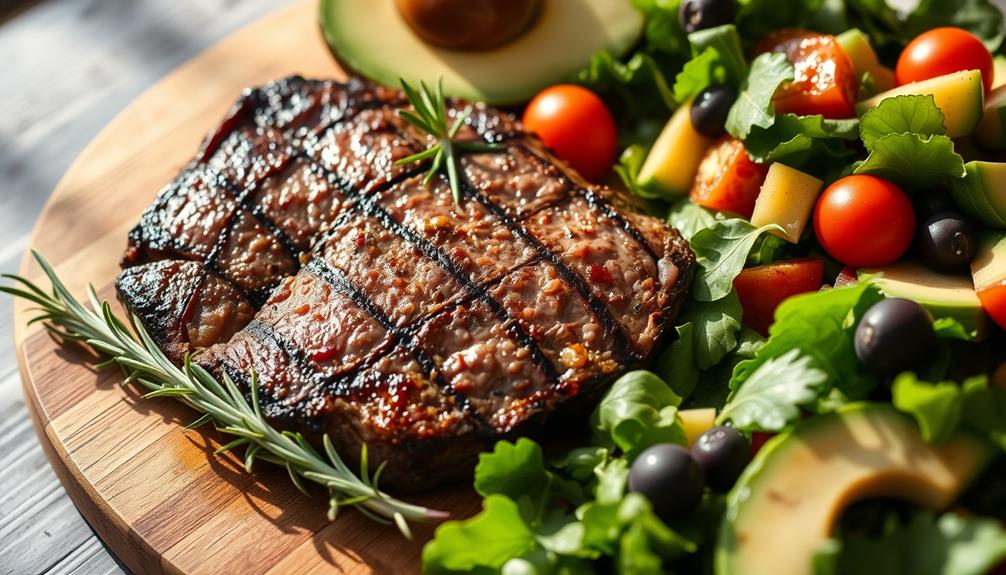
When it comes to the keto diet, steak is a standout choice. You'll find it's not just good; it's a perfect fit for your low-carb lifestyle. Steak contains zero carbs, which means you can enjoy it while maintaining ketosis. Plus, it's a high protein powerhouse, packed with essential amino acids that your body craves.
Additionally, incorporating natural remedies into your diet may complement your overall health while on keto.
Opt for the fattiest cuts like ribeye, skirt, or porterhouse. These cuts not only deliver on flavor but also provide the high fat content that supports your keto goals. By incorporating steak into your meals, you're boosting your intake of conjugated linoleic acid (CLA), which can aid in weight loss and muscle growth. It's a win-win for anyone looking to enhance their fitness journey.
Don't forget that steak also serves up essential micronutrients like iron, vitamin B12, niacin, and selenium. These nutrients are vital for overall health, ensuring you feel your best while following the keto diet.
Pair your steak with low-carb sides like salads or sautéed vegetables to elevate your meal while keeping carbohydrate intake minimal. Enjoying steak on keto has never been easier or more satisfying!
Carbohydrate Content in Steak
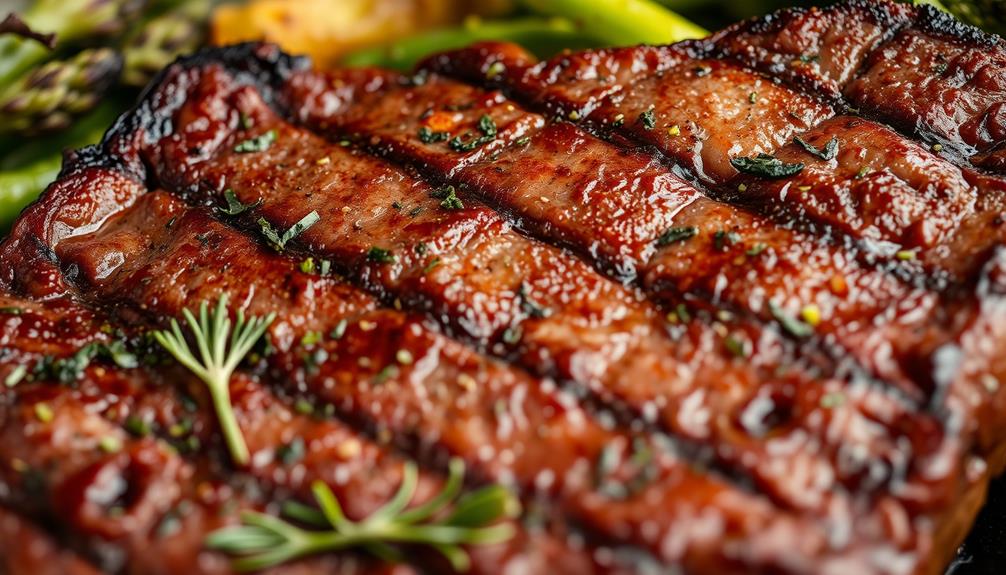
When you're following a keto diet, you'll love that all cuts of steak are carb-free, making them perfect for your meal plan.
Additionally, steak is rich in proteins and essential nutrients, which can support muscle maintenance and overall health.
While ribeye stands out for its high fat content and zero carbs, other cuts may have slight variations in fat and protein.
Understanding these differences can help you make the best choices for your keto lifestyle, especially if you're also considering nutritional benefits like those found in vegetables.
Carb-Free Steak Options
Steak lovers rejoice—carb-free steak options make it easy to stick to a ketogenic diet. All cuts of steak are fundamentally carb-free, which is fantastic news for anyone following keto. When you're selecting your meal, you can confidently choose from various cuts of steak without worrying about carbohydrate content.
Butter can enhance the flavor and moisture of your steak, making it a perfect pairing for a rich dining experience butter adds flavor.
Ribeye steak, in particular, is a favorite among keto dieters. With about 21.8g of fat and 23.7g of protein per 100 grams, it offers a satisfying combination of rich flavor and essential nutrients. The high fat content helps you stay in ketosis while enjoying a delicious meal.
While Salisbury steak does contain minimal carbs—around 5.78 grams per 100 grams—it's not as popular among keto enthusiasts. The zero carb content in all steak cuts allows for greater flexibility in your meal planning, making it easy to adhere to strict keto macros.
Incorporating steak into your diet not only supports your ketogenic lifestyle but also provides a rich nutrient profile, making it a staple choice for keto lovers. Enjoy your steak guilt-free and savor every bite!
Nutritional Variations by Cut
Across various cuts of steak, the nutritional profile can differ considerably, particularly in fat and protein content, while maintaining their carb-free status. If you're following a keto diet, understanding these differences is vital for optimizing your meals.
Additionally, incorporating investment strategies can guarantee you're financially prepared to enjoy these delicious cuts regularly.
Ribeye steak stands out as a favorite among keto dieters due to its high fat content. With approximately 21.8 grams of fat and 23.7 grams of protein per 100 grams, it's both flavorful and satisfying. The rich marbling in ribeye not only enhances its taste but also provides a higher energy density, making it an ideal choice for your ketogenic needs.
On the other hand, leaner cuts like sirloin offer less fat but still deliver a solid amount of protein, which can be beneficial if you're aiming to reduce your overall fat intake.
While Salisbury steak contains minimal carbs at about 5.78 grams per 100 grams, it's less popular among keto dieters compared to ribeye and sirloin.
Regardless of the cut you choose, steak remains a fantastic source of essential micronutrients, including thiamin, riboflavin, niacin, and vitamin B12, all of which are beneficial for your overall health.
Impact on Keto Diet
For those on a keto diet, the impact of steak on carbohydrate intake is remarkably beneficial. All steak cuts are fundamentally carb-free, allowing you to enjoy hearty meals while maintaining ketosis. This absence of carbohydrates means you can focus on healthy fats and protein, which are vital for your keto journey.
Here's a quick comparison of popular steak cuts:
| Steak Cut | Carbohydrate Content (per 100g) |
|---|---|
| Ribeye | 0g |
| Salisbury | 5.78g |
| Filet Mignon | 0g |
Ribeye steak stands out, favored for its high fat content, boasting about 21.8g of fat and 23.7g of protein per 100 grams. While Salisbury steak has minimal carbs, it's not as commonly chosen in keto meals. Incorporating various steak cuts into your meal plan can help you enjoy diverse flavors while staying within your carb limits. This way, you can relish delicious, satisfying dishes that complement your keto diet without compromising your goals.
Nutritional Benefits of Steak
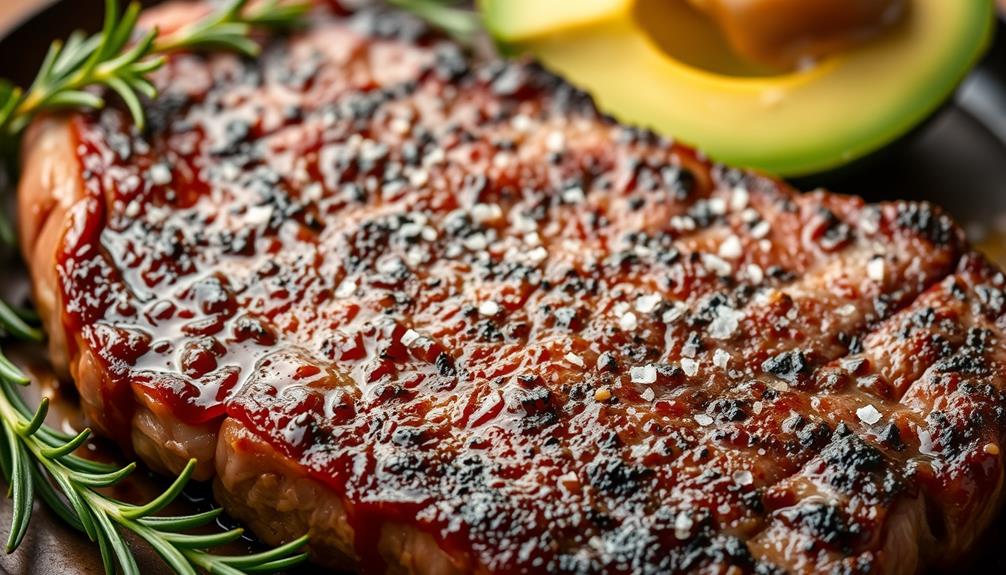
What makes steak such a powerhouse of nutrition? For starters, it's packed with essential micronutrients that your body craves. When you enjoy steak, you're getting high levels of bioavailable iron, zinc, and B vitamins, which are essential for overall health and energy production.
A typical ribeye steak delivers about 90.6g of protein per pound, making it an excellent source of energy and a great choice for building lean muscle. Additionally, incorporating steak into your diet can complement other nutrient-rich foods, such as essential oils for wellness, enhancing your overall nutritional intake.
Moreover, the high protein content in steak promotes greater satiety, helping you control your appetite and stick to your low-carb ketogenic lifestyle. The presence of conjugated linoleic acid (CLA) in steak not only supports weight loss but also boosts immune function and may help prevent diabetes.
Plus, important micronutrients like niacin and vitamin B12 play critical roles in metabolic processes and red blood cell formation.
Incorporating steak into your diet not only satisfies your hunger but also enriches your body with these essential nutrients, making it an ideal choice for anyone looking to maximize their nutritional benefits while following a keto diet.
Ideal Steak Cuts for Keto
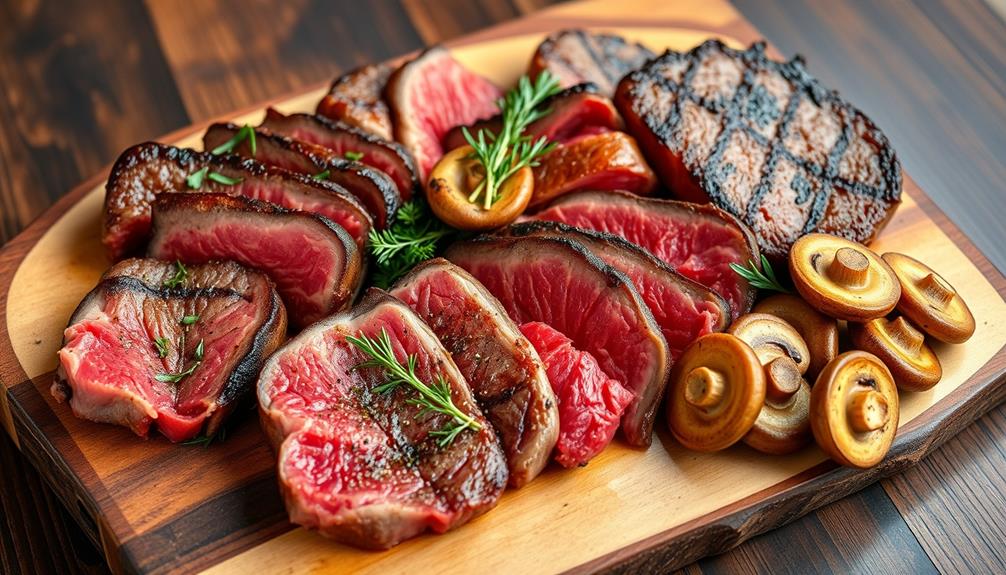
When it comes to selecting the ideal steak cuts for your keto diet, ribeye steak often tops the list thanks to its rich fat content. With around 37.6g of fat and 15g of saturated fat per 100g, it not only enhances flavor but also keeps you feeling full longer.
If you're looking for something quick to cook, skirt steak is another excellent option. Its intense flavor and fast cooking time make it perfect for those busy keto meals while keeping your carb count at bay. Pair it with a fresh leafy salad or some roasted low-carb vegetables for a delicious, well-rounded meal. For an even heartier option, serve the skirt steak alongside the best ketofriendly pasta, which can be made from ingredients like shirataki noodles or zucchini to keep your carbs in check. This combination makes for a satisfying, nutrient-rich dinner that satisfies cravings without compromising your diet goals.
New York strip steak is a great choice if you want a balance of flavor and tenderness. Its good marbling makes it popular among steak lovers.
For a generous portion, consider the porterhouse steak. It features both tenderloin and strip sections, adhering to keto principles with its higher fat content, making it ideal for sharing.
Finally, chuck steak stands out as an affordable option. It contains layers of fat and rich flavor, fitting perfectly into your keto meal plans while supporting your dietary fat intake.
These best cuts will help you stay satisfied and committed to your keto diet.
Preparing Steak for Keto
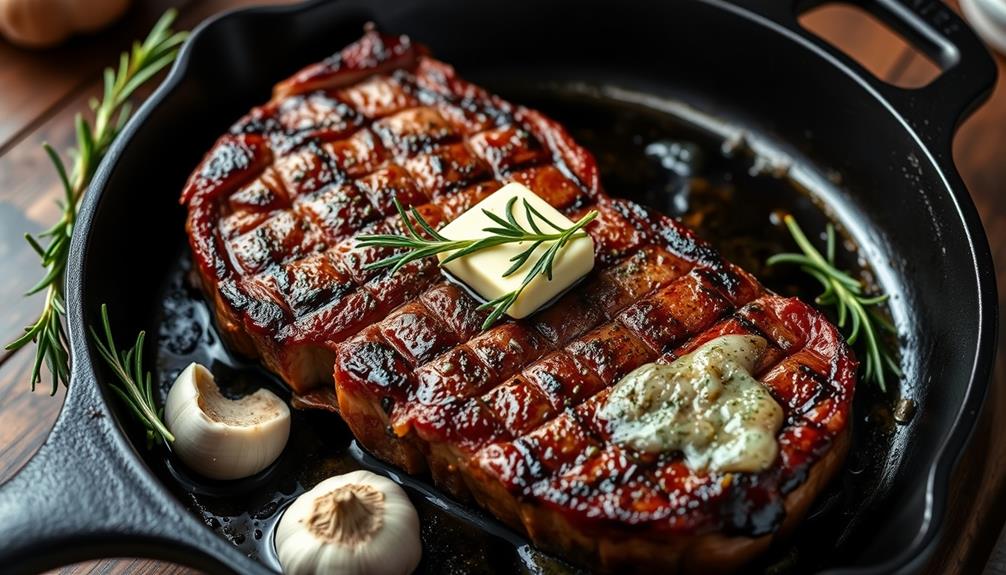
Preparing steak for your keto diet is vital to maximize flavor and tenderness. Start by bringing your cut of steak to room temperature before grilling. This step helps guarantee even cooking.
Just before you cook, season your steak with salt to retain moisture and enhance taste. For a perfect medium-rare, aim for an internal temperature of 135°F, grilling for about 4-5 minutes per side for a 1.5-inch thick cut.
To elevate tenderness, consider marinating tougher cuts like skirt steak in a low-carb marinade. This not only adds flavor but also aligns with your keto macros. Using a cooking thermometer is a smart move to achieve your desired doneness while keeping the steak keto-friendly.
After grilling, don't skip the resting phase; let your steak rest for at least 5 minutes, covered. This important step allows the juices to redistribute, enhancing the overall flavor.
Keto-Friendly Side Dishes
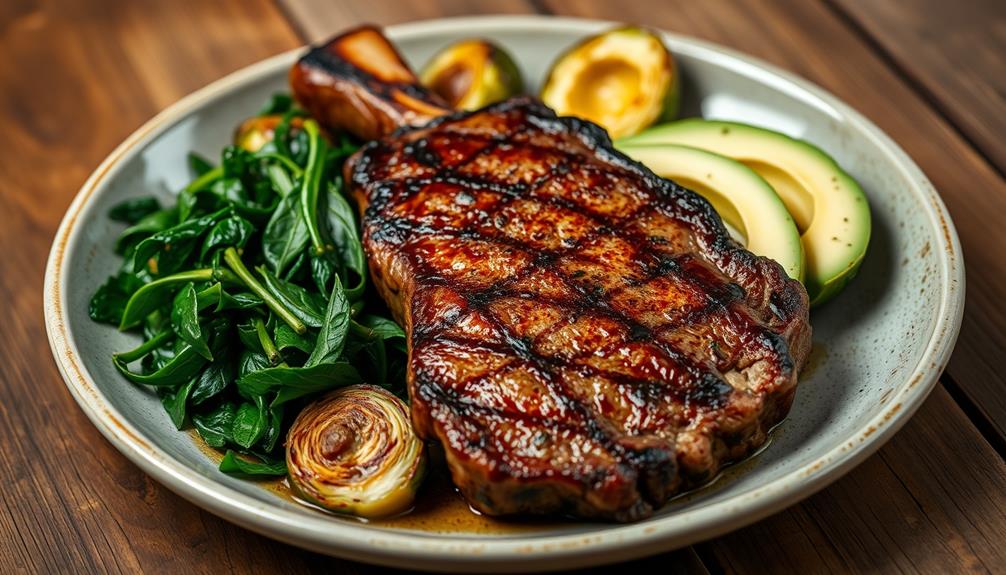
Pairing steak with keto-friendly side dishes can elevate your meal while keeping your carb counts low. Incorporating low-carb vegetables not only enhances flavor but also supports your overall health. Here are three delicious options you can try:
- Cauliflower Rice: This popular rice alternative mimics the texture of traditional rice while remaining low in carbohydrates and calories. It's a versatile base for your steak.
- Grilled Vegetables: Zucchini, asparagus, and bell peppers make excellent grilled companions. Their vibrant flavors and minimal carbs complement the richness of the steak beautifully.
- Mediterranean Low Carb Broccoli Salad: This invigorating dish combines broccoli with olive oil and cheese, adding healthy fats while maintaining a low carb count. It provides a crunchy, satisfying contrast to your meal.
For a quick and nutritious choice, consider easy sautéed fresh green beans. They pair perfectly with steak, ensuring you stay within your keto guidelines.
Ribeye: The Best Choice
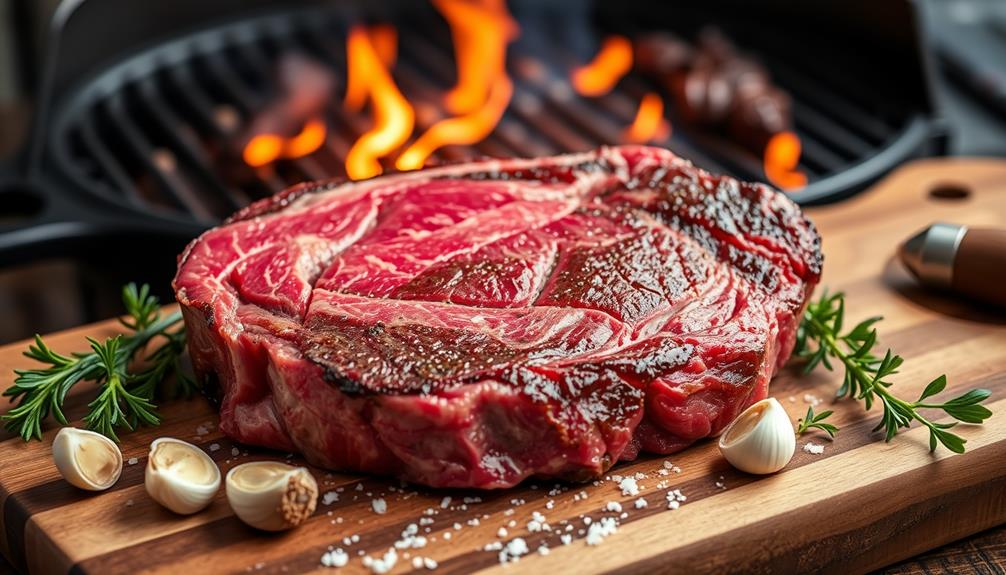
Ribeye steak stands out as the best choice for anyone following a keto diet. With its high fat content, ribeye provides approximately 37.6g of fat and 15g of saturated fat per 100g serving, making it an ideal option for those aiming to increase their fat intake. The rich marbling not only enhances the flavor but also guarantees a tender bite, satisfying your taste buds while keeping you on track with your dietary goals.
Nutritionally, ribeye steak is dense, offering essential vitamins and minerals like iron, zinc, and B12, all crucial for your overall health.
With around 763 calories per pound, this hearty cut supports satiety, helping you feel full longer on a low-carb diet. The ideal fat-to-protein ratio in ribeye aligns perfectly with keto guidelines, promoting effective adherence to your ketogenic eating plan.
When you choose ribeye steak, you're not just indulging in a delicious meal; you're also fueling your body with quality nutrients that support your keto lifestyle.
Dining Out on Keto

Dining out on a keto diet can be a delicious adventure if you know how to navigate the menu. When you choose a ribeye steak, you're already on the right track, thanks to its high fat content.
To make your dining experience even better, keep these tips in mind:
- Select Keto-Friendly Side Dishes: Pair your steak with green vegetables like broccoli or asparagus. They'll keep your carb count low while providing essential nutrients.
- Watch for Hidden Carbs: Be cautious with sauces and dressings. Many contain sugars that can sneakily add to your carb intake, so ask about their ingredients before you indulge.
- Request Simple Preparations: Opt for your steak cooked without breading or marinades. This helps maintain your keto principles and guarantees you enjoy a satisfying meal without unnecessary carbs.
Before you head out, research the restaurant's menu online. This prep work allows you to find keto-friendly options and make informed choices, guaranteeing your dining experience aligns with your keto diet goals.
Enjoy your meal while staying committed to your dietary needs!
Health Considerations of Steak
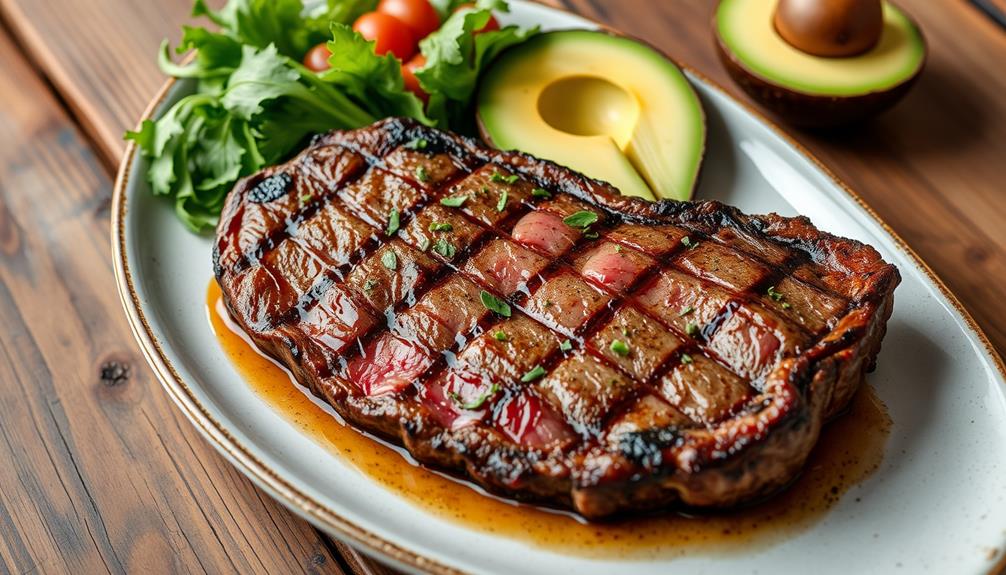
Steak is a powerhouse of nutrition, especially for those following a keto diet. When you indulge in a delicious cut like ribeye, you're not just savoring flavor; you're also reaping numerous health benefits. The healthy fats in steak provide essential fatty acids that support energy production and hormone regulation. Plus, the high protein content aids in muscle maintenance, making it a great choice for your ketogenic lifestyle.
Here's a quick overview of the health considerations of steak:
| Health Aspect | Details |
|---|---|
| Protein Content | Aids muscle maintenance and satiety |
| Micronutrients | Rich in iron, zinc, and B vitamins |
| Saturated Fat | Moderate consumption is less harmful |
| Cardiovascular Health | May promote heart health in a whole foods diet |
Research indicates that moderate meat consumption, including steak, can be beneficial without negative health outcomes. The saturated fat found in steak, particularly when consumed as part of a balanced diet, is less concerning than saturated fats from processed foods. So, enjoy your steak while reaping the rewards of a healthy ketogenic diet!
Organ Meats for Keto
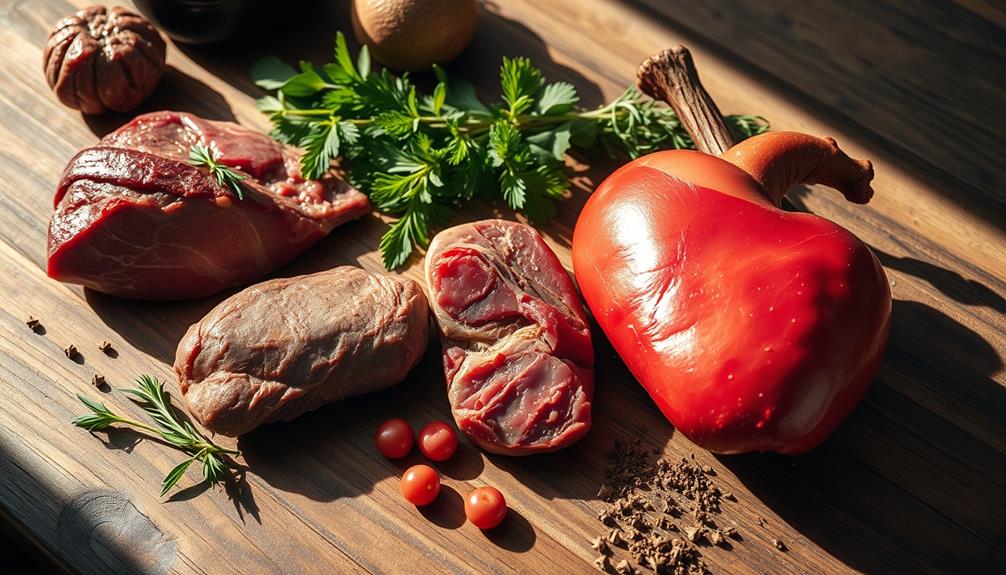
If you're on a keto diet, organ meats can be a powerhouse of nutrition you won't want to overlook.
Options like beef liver, kidney, and heart are packed with essential vitamins and nutrients while keeping carbs low.
Let's explore the best choices and cooking tips to make these nutrient-dense foods a delicious part of your meals.
Nutritional Benefits of Organ Meats
Incorporating organ meats into your keto diet can greatly enhance your nutritional intake. These nutrient-dense foods are packed with essential vitamins and minerals that support your health while keeping your carb count low.
Here are three key benefits of including organ meats:
- Nutrient Density: Organ meats, especially beef liver, are rich in vitamins A, E, K2, D, and C. These nutrients play critical roles in immune function and overall well-being.
- High-Protein, Low-Carb: A 100g serving of beef liver contains about 135 calories, 20.4g of protein, and only 3.9g of net carbs. This makes it a fantastic choice for maintaining a high-protein, low-carb diet.
- Bioavailable Nutrients: Organ meats provide easily absorbable iron, zinc, and B vitamins, which can boost your energy levels and metabolic health.
Best Organ Meats Choices
When it comes to choosing organ meats for your keto diet, beef liver stands out as a powerhouse of nutrition.
It's packed with essential vitamins like A, D, E, K2, and B12, making it a fantastic choice for anyone looking to boost their nutrient intake while staying low-carb. With only 3.9 grams of net carbs per 100 grams, beef liver fits perfectly within the requirements of a ketogenic diet.
But don't overlook other organ meats, too. Kidneys, pancreas, and heart offer rich protein and healthy fats while remaining low in carbohydrates.
These options not only enhance your meals but also provide a variety of nutrients that can support your overall health.
For example, beef liver has about 135 calories, 3.6 grams of fat, and 20.4 grams of protein per 100 grams, making it a well-rounded source of nutrition for keto dieters.
Incorporating organ meats into your meal plan can help you achieve ideal nutrient intake while adhering to your low-carb lifestyle.
Cooking Organ Meats Tips
Cooking organ meats can seem intimidating, but with the right techniques, you can release their rich flavors and nutritional benefits. Organ meats, like beef liver, are a powerhouse of protein and essential vitamins, making them perfect for your keto diet and weight loss goals.
Here are some tips to help you get started:
- Slow-Cook: Use methods like braising or slow-cooking to retain moisture and tenderness. Organ meats can be denser than muscle meats, so this approach helps break down tough fibers.
- Marinate: Enhance flavor and tenderness by marinating organ meats. Incorporating acidic components such as lemon juice or vinegar can help soften the meat while infusing it with taste.
- Source Quality: Always choose high-quality, fresh organ meats. They offer superior flavor and nutritional benefits compared to processed options, ensuring you get the most out of your meals.
Frequently Asked Questions
Can I Eat as Much Steak as I Want on Keto?
You can't eat as much steak as you want on keto. Portion control's essential to maintain your weight loss goals and ketosis. Balance your meals with healthy fats and monitor your body's response for best results.
What Red Meat Can You Eat on Keto?
When you're steering through the keto landscape, think of red meat as your sturdy ship. You can enjoy ribeye, skirt, and chuck steak; they're low in carbs and rich in satisfying fats and proteins.
Is Sirloin Steak Good for Keto?
Yes, sirloin steak's low carbohydrate content and high protein make it a great choice for your keto diet. You can enhance its flavor with healthy fats, and it's versatile for various tasty meals.
Is NY Strip Good for Keto?
Is there a better steak for your keto meals than New York Strip? Its low carb content and rich marbling make it a delicious, nutritious choice, ensuring you enjoy flavorful dishes while sticking to your dietary goals.
Conclusion
As you navigate the culinary landscape of the keto diet, think of steak as a sturdy ship sailing through a sea of carbohydrates. With each cut, you're not just choosing a meal; you're selecting a treasure chest filled with rich nutrients and flavors. Ribeye stands as the captain, guiding you toward deliciousness and satisfaction. So, embrace the journey, savor every bite, and let the wholesome goodness of steak be your compass on this flavorful adventure.
